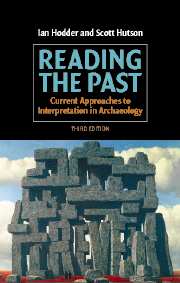Book contents
- Frontmatter
- Contents
- Preface to the first edition
- Preface to the second edition
- Preface to the third edition
- 1 The problem
- 2 Processual and systems approaches
- 3 Structuralist, post-structuralist and semiotic archaeologies
- 4 Marxism and ideology
- 5 Agency and practice
- 6 Embodied archaeology
- 7 Archaeology and history
- 8 Contextual archaeology
- 9 Post-processual archaeology
- 10 Conclusion : archaeology as archaeology
- Bibliography
- Index
5 - Agency and practice
Published online by Cambridge University Press: 05 June 2012
- Frontmatter
- Contents
- Preface to the first edition
- Preface to the second edition
- Preface to the third edition
- 1 The problem
- 2 Processual and systems approaches
- 3 Structuralist, post-structuralist and semiotic archaeologies
- 4 Marxism and ideology
- 5 Agency and practice
- 6 Embodied archaeology
- 7 Archaeology and history
- 8 Contextual archaeology
- 9 Post-processual archaeology
- 10 Conclusion : archaeology as archaeology
- Bibliography
- Index
Summary
Practice and structuration
In outlining a ‘theory of practice’, Bourdieu (1977) notes the difference between, on the one hand, observing and analysing social events, and, on the other hand, participating in activities. Structuralism, for example, allows us to see how pattern is generated, but gives us no indication of how we make relevant use of structures in constantly changing situations. Giddens (1979; 1981) is also concerned to escape notions of change which involve the playing out of some pre-set code.
Both Bourdieu and Giddens thus develop theories of practice or social action, called by Giddens ‘structuration’, in which there is a recursive relationship between structure and practice. Bourdieu's account is of particular relevance to archaeologists because he develops his theory in relation to material culture and the use of space. Indeed his ideas have been applied in ethnoarchaeology by, for example, Donley (1982), Moore (1982), and Braithwaite (1982), and in archaeology by Barrett (1981) and Davis (1984).
Bourdieu situates the notion of the habitus, a term first coined by Marcel Mauss (1973 [1935]), between structure and practice. However, any attempt to define the habitus (singular and plural) goes against the grain of Bourdieu's project. As part of his challenge to certain types of objectivism, Bourdieu argues that a concept is understood through its use: any attempt to formalise it – to step back from the context of use and construct a rule that systematises the ways it is used – misrecognizes the ambiguity and unpredictability of the situations in which the concept is exercised.
- Type
- Chapter
- Information
- Reading the PastCurrent Approaches to Interpretation in Archaeology, pp. 90 - 105Publisher: Cambridge University PressPrint publication year: 2003

